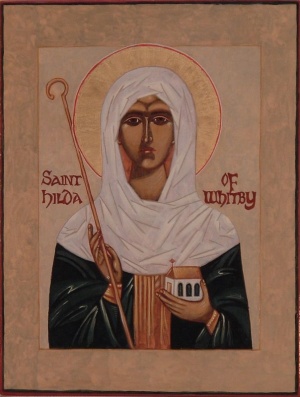Hilda din Whitby: Diferență între versiuni
(Pagină nouă: {{Traducere EN}}right|thumb|Sf. Hilda din Whitby Cuvioasa '''Hilda din Whitby''' (614-680) a fost stareță a Abația Whitby|Abație...) |
(Nicio diferență)
|
Versiunea de la data 17 noiembrie 2023 15:15
| Acest articol (sau părți din el) este propus spre traducere din limba engleză!
Dacă doriți să vă asumați acestă traducere (parțial sau integral), anunțați acest lucru pe pagina de discuții a articolului. |
Cuvioasa Hilda din Whitby (614-680) a fost stareță a Abației Whitby în nordul Angliei în secolul al VII-lea. Prăznuirea ei în Biserica Ortodoxă se face la 17 noiembrie.
Viața
Practic tot ce se știe despre Sf. Hilda provine din scrierile venerabilului Beda. She was the daughter of Hereric, the nephew of King Edwin of Northumbria, and she seems like her great-uncle to have become a Christian through the preaching of St. Paulinus (unul din misionarii veniți din Roma) about the year 627, when she was thirteen years old.
Moved by the example of her sister Hereswith, who, after marrying Ethelhere of East Anglia, became a nun at Chelles in Gaul, Hilda also journeyed to East Anglia, intending to follow her sister abroad. But St. Aidan recalled her to her own country, and after leading a monastic life for a while on the north bank of the Wear and afterwards at Hartlepool, where she ruled a double monastery of monks and nuns with great success, Hilda eventually undertook to set in order a monastery at Streaneshalch, a place to which the Danes a century or two later gave the name of Whitby.
Under the rule of St. Hilda the monastery at Whitby became very famous. The Holy Scriptures were specially studied there, and no less than five of the monastics became bishops, St. John, Bishop of Hexham, and still more St. Wilfrid, Bishop of York, rendering untold service to the Anglo-Saxon church at this critical period of the struggle with paganism. Here, in 664, was held the important synod at which King Oswiu, convinced by the arguments of St. Wilfrid, decided, among other issues, a manner of calculating the date for Northumbria's observance of Pascha. St. Hilda herself later on seems to have sided with Archbishop Theodore against Wilfrid. The fame of St. Hilda's wisdom was so great that from far and near monks and even royal personages came to consult her. Seven years before her death the saint was stricken down with a grievous fever which never left her till she breathed her last, but, in spite of this, she neglected none of her duties to God or to her spiritual children. She passed away most peacefully after receiving Eucharist, and the tolling of the monastery bell was heard miraculously at Hackness thirteen miles away, where also a devout nun named Begu saw the soul of St. Hilda borne to heaven by angels.With St. Hilda is intimately connected the story of Caedmon, the sacred bard. When he was brought before St. Hilda she admitted him to take monastic vows in her monastery, where he most piously died.
The cultus of St. Hilda from an early period is attested by the inclusion of her name in the calendar of St. Willibrord, written at the beginning of the eighth century. It was alleged at a later date the remains of St. Hilda were translated to Glastonbury by King Edmund, but this is only part of the "great Glastonbury myth." Another story states that St. Edmund brought her relics to Gloucester. There are a dozen or more old English churches dedicated to St. Hilda on the northeast coast, and "South Shields" is probably a corruption of St. Hilda.
Sfânta Hilda a fost, împreună cu Sfânta Ebba din Coldingham (prăznuită la 25 august), una dintre figurile marcante ale creștinismului celtic timpuriu și reprezintă unul dintre puținele exemple ale unei amma care a primit de la Dumnezeu darul de a conduce atât comunități religioase cât și grupuri de călugări, de a îndruma credincioșii și de a da sfaturi înțelepte episcopilor care o ascultau, pentru că în Hristos Iisus nu mai există nici bărbat, nici femeie, ci un singur om nou (Galateni 3, 28).
Surse
Legături externe
- St. Hilda of Whitby, from St. Wilfrid's Church in England (Anglican)
- St. Hilda, from Brittania.com
Categorii > Istoria Bisericii
Categorii > Istoria Bisericii
Categorii > Liturgică > Sărbători > Sfinți
Categorii > Liturgică > Sărbători > Sfinți > Cuvioși
Categorii > Liturgică > Sărbători > Sfinți > Sfinți celtici și anglo-saxoni
Categorii > Locuri > Ortodoxia pe țări
Categorii > Locuri > Ortodoxia pe țări > Ortodoxia în Europa Vestică > Ortodoxia în Regatul Unit
Categorii > Oameni
Categorii > Oameni
Categorii > Oameni
Categorii > Oameni > Monahi
Categorii > Viața Bisericii > Monahism
Categorii > Viața Bisericii > Monahism

